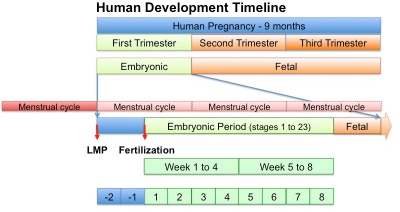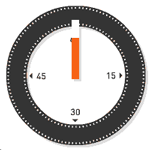BGDA Practical - Implantation to 8 Weeks: Difference between revisions
m (Protected "BGDA Practical - Implantation to 8 Weeks" ([edit=sysop] (indefinite) [move=sysop] (indefinite))) |
mNo edit summary |
||
| (19 intermediate revisions by the same user not shown) | |||
| Line 1: | Line 1: | ||
[[File:BGDsmall.jpg|left]] | [[File:BGDsmall.jpg|left]] | ||
==Introduction== | ==Introduction== | ||
{{ | {{BGDALab7}} | ||
[[File:Human development timeline graph 02.jpg|thumb|400px]] | [[File:Human development timeline graph 02.jpg|thumb|400px|link=One Minute Embryology#Human Timeline|Human development timeline]] | ||
[[File:Stage11_sem6.jpg|thumb|300px]] | [[File:Stage11_sem6.jpg|thumb|300px]] | ||
{{BGDAPracTable}} | |||
The first Embryology practical covered gametogenesis, fertilization, implantation and early events of embryonic development. The third week is the begining of the embryonic period which continues through to week eight. | The first Embryology practical covered gametogenesis, {{fertilization}}, {{implantation}} and early events of embryonic development. The third week is the begining of the embryonic period which continues through to week eight. | ||
This period of development is complex, and an entire class could be spent on folding or development of any one organ system. Therefore the Lab must be reasonably general when covering organogenesis, organ/system development. In particular, the following topics are covered in detail in BGD Cycle B: gastrointestinal tract, head, sensory and urogenital development. These topics will not be described in detail here. | This period of development is complex, and an entire class could be spent on folding or development of any one organ system. Therefore the Lab must be reasonably general when covering organogenesis, organ/system development. In particular, the following topics are covered in detail in BGD Cycle B: gastrointestinal tract, head, sensory and urogenital development. These topics will not be described in detail here. | ||
We will also be using the Carnegie stage 7-23 images to examine external changes on the embryo. These stages are also shown in the movie "Carnegie stage human growth through embryonic period". Identify the key structures in figures on the following pages and discuss as a small group the dynamic events of development that are occurring at this early stage. If required ask your tutor for assistance. For new terms use the glossary link found at the bottom of each page. | |||
{| | {| | ||
| < | | <html5media height="496" width="386">File:Embryo stages 003.mp4</html5media> | ||
Stages are based on the external and/or internal morphological development of the vertebrate embryo, and are not directly dependent on either age or size. The human embryonic period proper is divided into 23 Carnegie stages. Criteria beyond morphological features include age in days, number of somites present, and embryonic length. '''Important note''' - the day timing of stages is only approximate, it is the sequence that is important. | [[Media:Embryo_stages_003.mp4|'''Click Here''' to play on mobile device]] | ||
| Stages are based on the external and/or internal morphological development of the vertebrate embryo, and are not directly dependent on either age or size. The human embryonic period proper is divided into 23 Carnegie stages. Criteria beyond morphological features include age in days, number of somites present, and embryonic length. '''Important note''' - the day timing of stages is only approximate, it is the sequence that is important. | |||
| Line 29: | Line 26: | ||
|- | |- | ||
|} | |} | ||
===Practical Class Note=== | ===Practical Class Note=== | ||
* Material under the heading "Additional Information" on each page is not part of today's practical and is provided as supporting information only. | * Material under the heading "Additional Information" on each page is not part of today's practical and is provided as supporting information only. | ||
* "Embryo Stages and Events" is part of this additional information and is provided to allow you to see what else is going on within the embryo. | * "Embryo Stages and Events" is part of this additional information and is provided to allow you to see what else is going on within the embryo. | ||
{| | |||
| {{OneMinuteClock}} | |||
| [[One_Minute_Embryology#Human_Embryo|'''1 Minute Embryology''']] | [https://thebox.unsw.edu.au/video/1-minute-embryology-human-embryo UNSW theBox] | |||
|} | |||
==Textbooks== | ==Textbooks== | ||
| Line 39: | Line 39: | ||
{| | {| | ||
|- | |- | ||
| [[File:Logo.png| | | [[File:Logo.png|alt=Embryo logo|90px]] | ||
| | | {{Embryo citation}} | ||
* [[Week 3]] | [[Week 4]] | [[Week 5]] | [[Week 6]] | [[Week 7]] | [[Week 8]] | * [[Week 3]] | [[Week 4]] | [[Week 5]] | [[Week 6]] | [[Week 7]] | [[Week 8]] | ||
* [[BGDA_Practical_-_Fertilization_to_Implantation|BGDA Practical 3 - Fertilization to Implantation]] | |||
* {{menstrual cycle}} | {{oocyte}} | {{spermatozoa}} | {{meiosis}} | {{mitosis}} | |||
* {{fertilization}} | {{zygote}} | {{morula}} | {{blastocyst}} | {{Implantation}} | |||
* [[Gastrulation]] | [[Somitogenesis]] | |||
* [[Lecture - Fertilization]] | [[Lecture - Week 1 and 2 Development|Lecture - Week 1 and 2]] | |||
* [[Movies]] | [[Movies#Week_1|Week 1]] | [[Movies#Week_2|Week 2]] | [[Movies#Week_3|Week 3]] | |||
|- | |- | ||
| [[File:The Developing Human, | | width=95px|[[File:The Developing Human, 10th edn.jpg|90px]] | ||
| | | {{MPT2015APAcitation}}(links only function with UNSW connection) | ||
Chapter 5 [http://ebookcentral.proquest.com.wwwproxy1.library.unsw.edu.au/lib/unsw/reader.action?docID=2074364&ppg=104 Fourth to Eighth Weeks of Human Development] | |||
Chapter 6 [http://ebookcentral.proquest.com.wwwproxy1.library.unsw.edu.au/lib/unsw/reader.action?docID=2074364&ppg=132 Fetal Period] | |||
Chapter 20 [http://ebookcentral.proquest.com.wwwproxy1.library.unsw.edu.au/lib/unsw/reader.action?docID=2074364&ppg Human Birth Defects] | |||
|- | |- | ||
| [[File:Larsen's human embryology | | [[File:Larsen's human embryology 5th ed.jpg|90px]] | ||
| | | {{Larsen2015APAcitation}}(links only function with UNSW connection) | ||
Chapter 3 [http://www.unsw.eblib.com.wwwproxy0.library.unsw.edu.au/patron/Read.aspx?p=2074524&pg=75 Third Week: Becoming Trilaminar and Establishing Body] | |||
Chapter 4 [http://ebookcentral.proquest.com.wwwproxy1.library.unsw.edu.au/lib/unsw/reader.action?docID=2074524&ppg=100 Fourth Week: Forming the Embryo] | |||
Chapter 6 [http://ebookcentral.proquest.com.wwwproxy1.library.unsw.edu.au/lib/unsw/reader.action?docID=2074524&ppg=151 Fetal Development and the Fetus as Patient] | |||
|} | |} | ||
{{ | |||
{{BGDALab7}} | |||
{{ | {{BGDAFooter}} | ||
Latest revision as of 12:12, 12 May 2019
Introduction
| Practical 6: Week 3 | Week 4 | Week 5 | Week 6 | Week 7 | Week 8 |
| Practical 3 - Fertilization to Implantation | Practical 6 - Implantation to 8 Weeks | Practical 12 - Fetal Period |
The first Embryology practical covered gametogenesis, fertilization, implantation and early events of embryonic development. The third week is the begining of the embryonic period which continues through to week eight.
This period of development is complex, and an entire class could be spent on folding or development of any one organ system. Therefore the Lab must be reasonably general when covering organogenesis, organ/system development. In particular, the following topics are covered in detail in BGD Cycle B: gastrointestinal tract, head, sensory and urogenital development. These topics will not be described in detail here.
We will also be using the Carnegie stage 7-23 images to examine external changes on the embryo. These stages are also shown in the movie "Carnegie stage human growth through embryonic period". Identify the key structures in figures on the following pages and discuss as a small group the dynamic events of development that are occurring at this early stage. If required ask your tutor for assistance. For new terms use the glossary link found at the bottom of each page.
| <html5media height="496" width="386">File:Embryo stages 003.mp4</html5media> | Stages are based on the external and/or internal morphological development of the vertebrate embryo, and are not directly dependent on either age or size. The human embryonic period proper is divided into 23 Carnegie stages. Criteria beyond morphological features include age in days, number of somites present, and embryonic length. Important note - the day timing of stages is only approximate, it is the sequence that is important.
|
Practical Class Note
- Material under the heading "Additional Information" on each page is not part of today's practical and is provided as supporting information only.
- "Embryo Stages and Events" is part of this additional information and is provided to allow you to see what else is going on within the embryo.
| 1 Minute Embryology | UNSW theBox |
Textbooks

|
Hill, M.A. (2020). UNSW Embryology (20th ed.) Retrieved April 16, 2024, from https://embryology.med.unsw.edu.au
|

|
Moore, K.L., Persaud, T.V.N. & Torchia, M.G. (2015). The developing human: clinically oriented embryology (10th ed.). Philadelphia: Saunders.(links only function with UNSW connection)
Chapter 5 Fourth to Eighth Weeks of Human Development Chapter 6 Fetal Period Chapter 20 Human Birth Defects |

|
Schoenwolf, G.C., Bleyl, S.B., Brauer, P.R., Francis-West, P.H. & Philippa H. (2015). Larsen's human embryology (5th ed.). New York; Edinburgh: Churchill Livingstone.(links only function with UNSW connection)
Chapter 3 Third Week: Becoming Trilaminar and Establishing Body Chapter 4 Fourth Week: Forming the Embryo |
| Practical 6: Week 3 | Week 4 | Week 5 | Week 6 | Week 7 | Week 8 |
BGDA: Lecture 1 | Lecture 2 | Practical 3 | Practical 6 | Practical 12 | Lecture Neural | Practical 14 | Histology Support - Female | Male | Tutorial
Glossary Links
- Glossary: A | B | C | D | E | F | G | H | I | J | K | L | M | N | O | P | Q | R | S | T | U | V | W | X | Y | Z | Numbers | Symbols | Term Link
Cite this page: Hill, M.A. (2024, April 16) Embryology BGDA Practical - Implantation to 8 Weeks. Retrieved from https://embryology.med.unsw.edu.au/embryology/index.php/BGDA_Practical_-_Implantation_to_8_Weeks
- © Dr Mark Hill 2024, UNSW Embryology ISBN: 978 0 7334 2609 4 - UNSW CRICOS Provider Code No. 00098G



